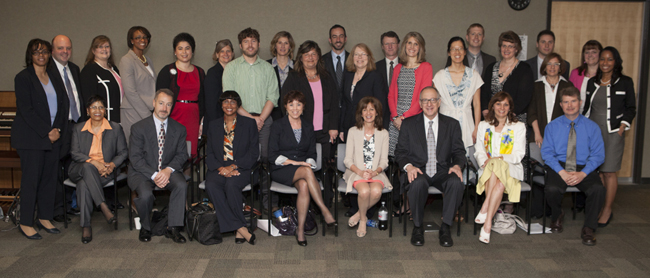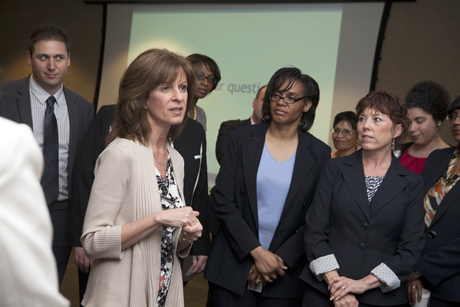Leading Cornell presentation draws president's invite
By Nancy Doolittle

After listening to this year’s Leading Cornell participants present their recommendations on how to develop, engage and retain staff, President David Skorton invited them to share the same material with his leadership team.
The offer reaffirmed for the 23-person class the value of their Leading Cornell experience, which began last October under the guidance of Sam Bacharach, co-founder of the Bacharach Leadership Group and the ILR School’s McKelvey-Grant Professor.
The nine-day leadership course teaches “micro-skills” Bacharach believes are key to leadership, including enlisting support and managing change, keeping people engaged, and coaching and mentoring others. In their second semester, participants complete a project that directly benefits the university.
Leading Cornell participants decided that their project would address concerns raised in the October 2011 Employee Survey: increasing communication by developing two-way feedback between supervisors and employees; providing “stretch” opportunities for staff to grow in their skills and careers; and talent management, by retaining and developing current high-potential staff and by recruiting and hiring new staff with high potential.

To inform their recommendations, the teams drew from the best practices of other Ivy League institutions, Ford and Bank of America, and feedback garnered from about 40 Cornell leaders.
The group recommended increasing communication by developing a website with online courses, tools, a video and a dialogue session with the Cornell Interactive Theatre Ensemble on the supervisory feedback process.
Through a survey given to 430 of Cornell’s deans, directors and department heads, the team exploring stretch opportunities discovered that while 38 percent of survey respondents cross-train their employees, only 6 percent offer job shadowing or job rotations.
The team recommended increasing awareness about the benefits of job rotation and providing tools to create job rotation opportunities, an online posting system of possible rotating positions, networks for managers to identify job rotation opportunities and potential matches, and giving HR staff tools to advise managers and staff interested in job rotations.
According to the third team, with 60 percent of staff becoming eligible for retirement in the next 10 years, talent management will be critical to Cornell’s growth. The team noted that the new Workday system includes talent management tools, but that these will only be effective if departments and units take a broad view about what is good for the university as a whole, rather than thinking just in terms of their own areas.
Leading Cornell participants were encouraged by Skorton’s reception of their recommendations. “You do all this work, you want to have an impact,” said one in a debriefing session. “I was proud to be represented by these teams,” said another.
Chris Halladay and Kathryn Burkgren are the course co-facilitators from the Human Resources’ Office of Organizational Effectiveness.
Media Contact
Get Cornell news delivered right to your inbox.
Subscribe